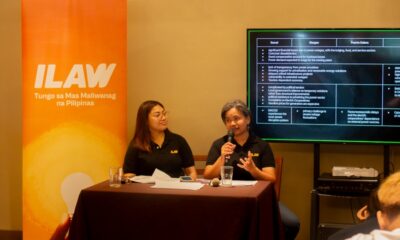Business
P32.6-B Target for 2019 Big Challenge: BOC-Cebu
The Bureau of Customs-Port of Cebu is facing a big challenge as its revenue collection target for 2019 is PHP6.21 billion more than the target assigned to this port last year, Cebu Customs District Collector Elvira Cruz said Tuesday.
This year’s target collection for the Port of Cebu is PHP32.61 billion, which is 23.5 percent higher than the PHP27.43 billion target collection for 2018, she said.
Although some sectors see it as “not realistically feasible,” Cruz told the Philippine News Agency (PNA) that her office will rally all the units in BOC-Cebu, including the X-ray Inspection Project, Customs Intelligence and Investigation Service, Enforcement and Security Service, and all sub-units to bolster the revenue collection effort under her jurisdiction.
“We need to work hand in hand in achieving this collection target assigned to us by the national government,” she said.
Cruz further said that “we are clutching our hope with the government implementation of the second tranche of the TRAIN Law.
The second round of the excise tax on petroleum products under Republic Act No. 10963 or the Tax Reform for Acceleration and Inclusion (TRAIN) Act of 2017 took effect last January 1.
In the Port of Cebu, importation of petroleum is the biggest contributor in its 2019 revenue performance, Cruz said.
Seaoil Philippines, Inc. was one of the top importers in Cebu last year.
BOC-Cebu Cash Division chief Conrado Abarintos said the 2019 target collection assigned by the Development Budget Coordinating Committee (DBCC) for the port can be achieved if the factors, including the economic condition in Cebu and the peso-to-dollar exchange rate, will remain positive this year.
“If all the assumptions and presumptions in coming up with the PHP32.618 billion target would materialize, we can achieve it,” Abarintos told the PNA. “We will do our best to achieve it as a matter of duty.”
According to Abarintos, the second round of the TRAIN Law plays a big role in accomplishing the PHP32-billion target collection for this year.
The BOC on Monday started to implement new rates for several commodities, including fuel, tobacco and alcoholic beverages covered under the second tranche of TRAIN Law and the Sin Tax Reform Law.
The new rates are being implemented under the bureau’s electronic-to-mobile (E2M) system, which began last January 4.
“Our economic managers have been tediously studying all the factors before they can set out the assigned revenue collection target for a port. We may see that it is big, but we are duty-bound to collect it,” Abarintos said.
Revenue collection targets assigned to all the collection district ports in the country are set by the DBCC, he said.
This committee is composed of the principals of the four member agencies: Department of Budget and Management, Department of Finance, National Economic and Development Authority, and the Office of the President, with the Budget Secretary acting as its chairperson.
It is primarily tasked to “review and approve the macroeconomic targets, revenue projections, borrowing level, aggregate budget level and expenditure priorities.” It recommends to the Cabinet and the President the consolidated public sector financial position and the national government fiscal program. (PNA)
































